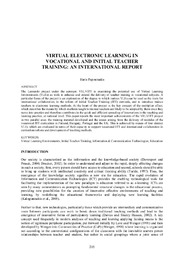Virtual electronic learning in Vocational and initial teacher Training: an international report

View/
Date
2007Author
Papoutsakis, HarisPublisher
University of CyprusPlace of publication
CY - ΛευκωσίαSource
CBLIS Conference Proceedings 2007 Contemporary Perspective on new technologies in science and educationGoogle Scholar check
Keyword(s):
Metadata
Show full item recordAbstract
The Leonardo project under the acronym VELVITT is examining the potential use of Virtual Learning Environments (VLEs) as tools to enhance and extend the delivery of teacher training in vocational subjects. A particular focus of the project is an exploration of the degree to which various VLEs can be used as the tools for international collaboration, in the reform of Initial Teacher Training (ITT) curricula, and to introduce trainee teachers to electronic learning methods. At the heart of the project is the key concept of the multiplier effect, which describes the means by which methods taught to trainee teachers are likely to be adopted by them once they move into practice and therefore contributes in the quick and efficient spreading of innovations in the teaching and learning practice, at national level. This paper reports the most important achievements of the VELVITT project in two parallel axes: the training material developed and the issues arising from the delivery of modules of the vocational ITT curriculum in Finland, Hungary, Portugal and the UK. This is achieved by means of four distinct
VLEs which are evaluated in terms of their capacity to support vocational ITT and international collaboration in curriculum reform and development of teaching methods.
